Psychology 2000CCJ: Case Study of Mark 'Chopper' Read's Crimes
VerifiedAdded on 2023/04/23
|12
|3197
|459
Case Study
AI Summary
This case study delves into the criminal behavior of Mark Brandon "Chopper" Read, a notorious Australian criminal, through the framework of social learning theory. The essay begins with an introduction to criminological theories, highlighting social learning theory as a key concept. It then provides an overview of Chopper Read's life, including his early childhood, criminal activities, and convictions. The core of the study focuses on explaining the key features and major assumptions of social learning theory, such as expectations, observation, behavioral capability, and reinforcement. The essay then applies these concepts to Chopper Read's life, illustrating how his environment, observations, and experiences shaped his criminal behavior. It examines how concepts like acquisition, instigation, and maintenance, as described by Bandura, relate to Read's actions. The study also acknowledges the cognitive aspects of social learning theory, including cognition and moral disengagement. Finally, the essay discusses the strengths and weaknesses of the arguments and concludes with a summary of the findings, reinforcing the applicability of social learning theory in understanding Chopper Read's criminal actions.

Psychology
2000CCJ Trimester 3
1/19/2019
Student’s Name
2000CCJ Trimester 3
1/19/2019
Student’s Name
Paraphrase This Document
Need a fresh take? Get an instant paraphrase of this document with our AI Paraphraser
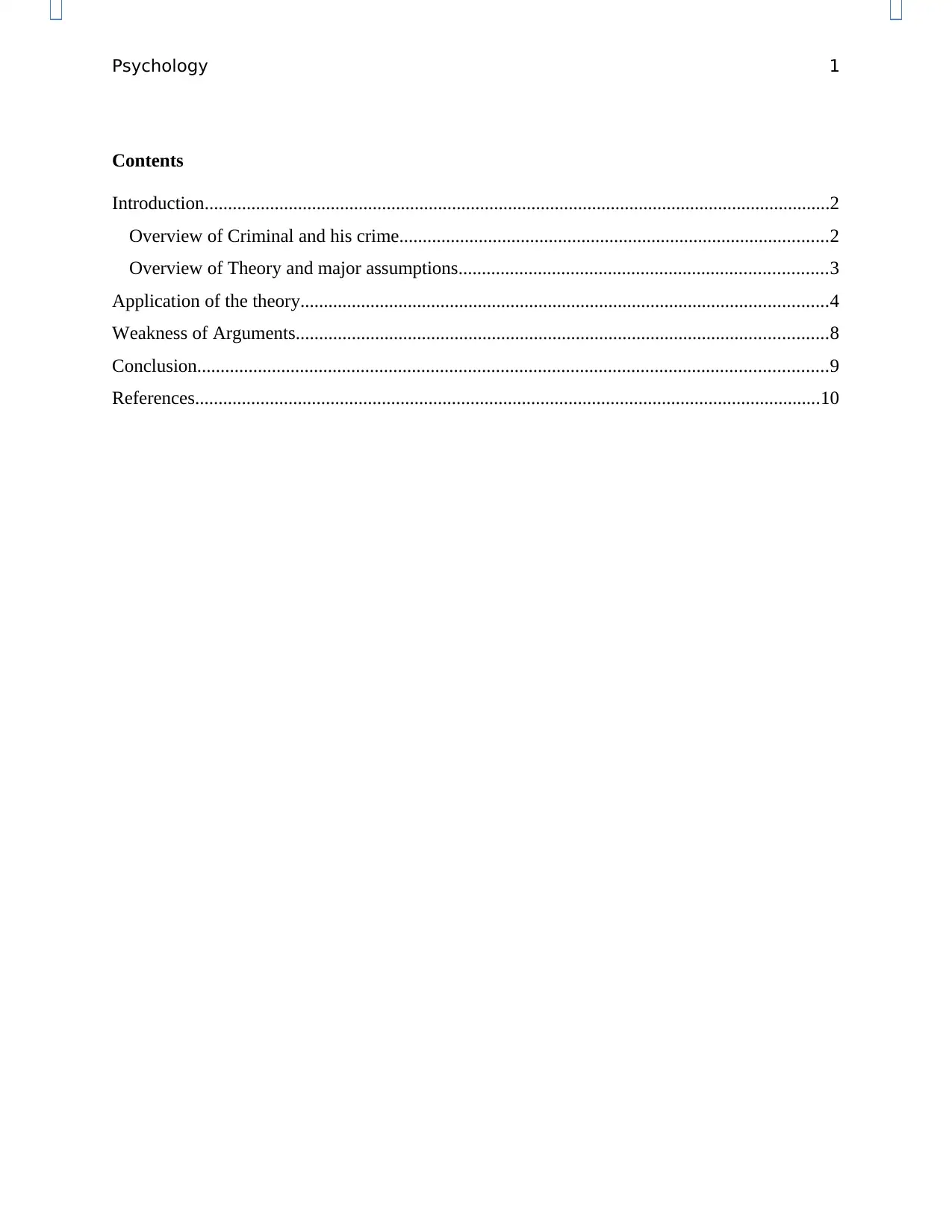
Psychology 1
Contents
Introduction......................................................................................................................................2
Overview of Criminal and his crime............................................................................................2
Overview of Theory and major assumptions...............................................................................3
Application of the theory.................................................................................................................4
Weakness of Arguments..................................................................................................................8
Conclusion.......................................................................................................................................9
References......................................................................................................................................10
Contents
Introduction......................................................................................................................................2
Overview of Criminal and his crime............................................................................................2
Overview of Theory and major assumptions...............................................................................3
Application of the theory.................................................................................................................4
Weakness of Arguments..................................................................................................................8
Conclusion.......................................................................................................................................9
References......................................................................................................................................10
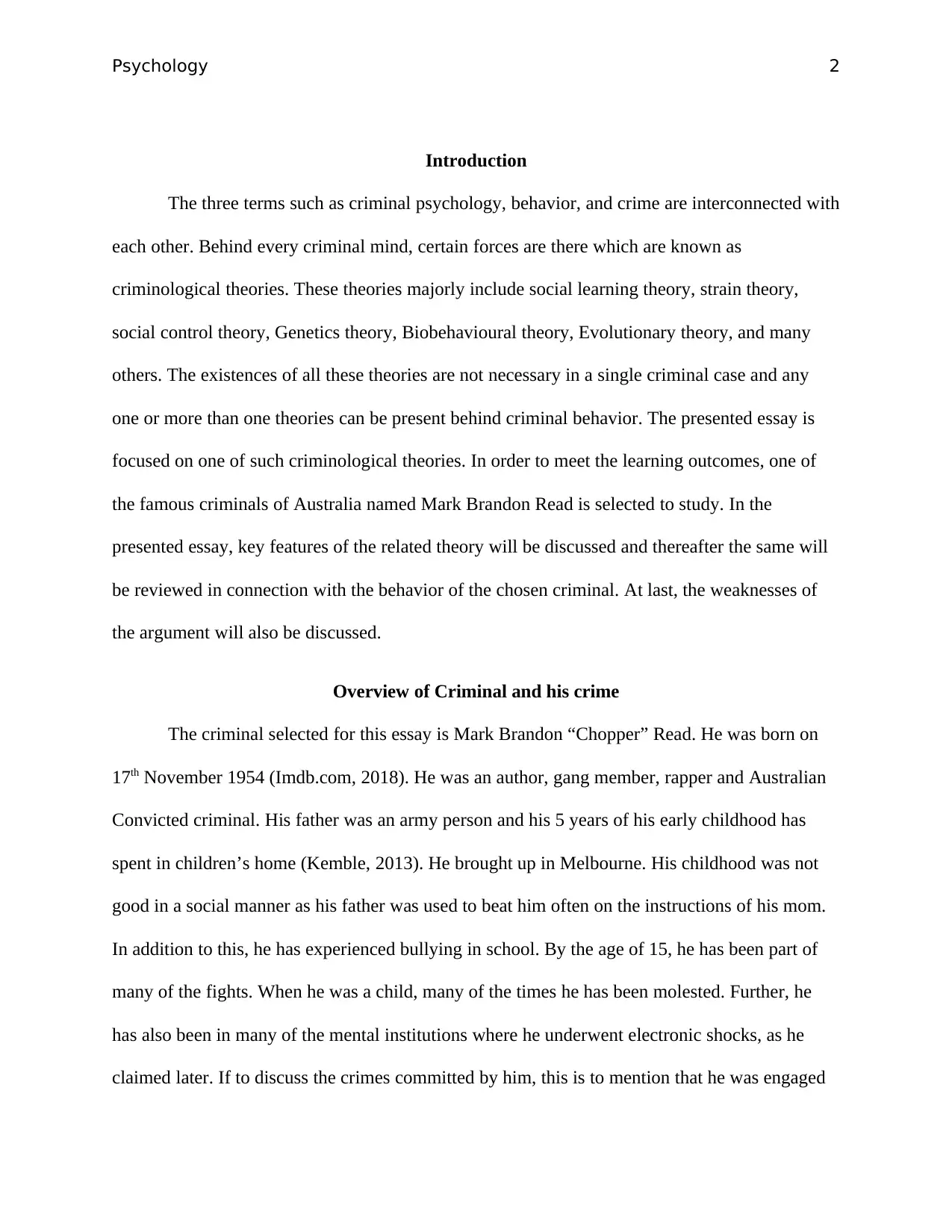
Psychology 2
Introduction
The three terms such as criminal psychology, behavior, and crime are interconnected with
each other. Behind every criminal mind, certain forces are there which are known as
criminological theories. These theories majorly include social learning theory, strain theory,
social control theory, Genetics theory, Biobehavioural theory, Evolutionary theory, and many
others. The existences of all these theories are not necessary in a single criminal case and any
one or more than one theories can be present behind criminal behavior. The presented essay is
focused on one of such criminological theories. In order to meet the learning outcomes, one of
the famous criminals of Australia named Mark Brandon Read is selected to study. In the
presented essay, key features of the related theory will be discussed and thereafter the same will
be reviewed in connection with the behavior of the chosen criminal. At last, the weaknesses of
the argument will also be discussed.
Overview of Criminal and his crime
The criminal selected for this essay is Mark Brandon “Chopper” Read. He was born on
17th November 1954 (Imdb.com, 2018). He was an author, gang member, rapper and Australian
Convicted criminal. His father was an army person and his 5 years of his early childhood has
spent in children’s home (Kemble, 2013). He brought up in Melbourne. His childhood was not
good in a social manner as his father was used to beat him often on the instructions of his mom.
In addition to this, he has experienced bullying in school. By the age of 15, he has been part of
many of the fights. When he was a child, many of the times he has been molested. Further, he
has also been in many of the mental institutions where he underwent electronic shocks, as he
claimed later. If to discuss the crimes committed by him, this is to mention that he was engaged
Introduction
The three terms such as criminal psychology, behavior, and crime are interconnected with
each other. Behind every criminal mind, certain forces are there which are known as
criminological theories. These theories majorly include social learning theory, strain theory,
social control theory, Genetics theory, Biobehavioural theory, Evolutionary theory, and many
others. The existences of all these theories are not necessary in a single criminal case and any
one or more than one theories can be present behind criminal behavior. The presented essay is
focused on one of such criminological theories. In order to meet the learning outcomes, one of
the famous criminals of Australia named Mark Brandon Read is selected to study. In the
presented essay, key features of the related theory will be discussed and thereafter the same will
be reviewed in connection with the behavior of the chosen criminal. At last, the weaknesses of
the argument will also be discussed.
Overview of Criminal and his crime
The criminal selected for this essay is Mark Brandon “Chopper” Read. He was born on
17th November 1954 (Imdb.com, 2018). He was an author, gang member, rapper and Australian
Convicted criminal. His father was an army person and his 5 years of his early childhood has
spent in children’s home (Kemble, 2013). He brought up in Melbourne. His childhood was not
good in a social manner as his father was used to beat him often on the instructions of his mom.
In addition to this, he has experienced bullying in school. By the age of 15, he has been part of
many of the fights. When he was a child, many of the times he has been molested. Further, he
has also been in many of the mental institutions where he underwent electronic shocks, as he
claimed later. If to discuss the crimes committed by him, this is to mention that he was engaged
⊘ This is a preview!⊘
Do you want full access?
Subscribe today to unlock all pages.

Trusted by 1+ million students worldwide
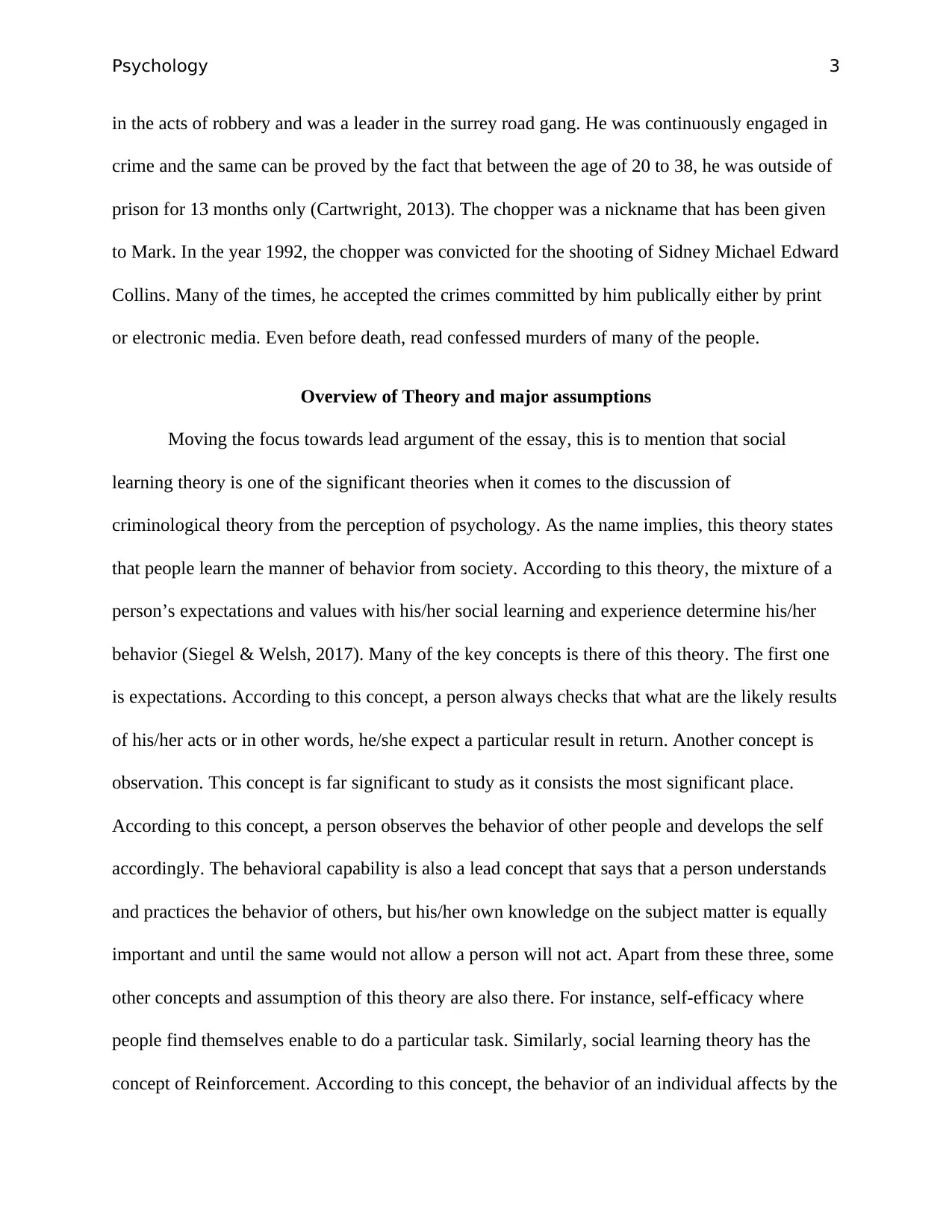
Psychology 3
in the acts of robbery and was a leader in the surrey road gang. He was continuously engaged in
crime and the same can be proved by the fact that between the age of 20 to 38, he was outside of
prison for 13 months only (Cartwright, 2013). The chopper was a nickname that has been given
to Mark. In the year 1992, the chopper was convicted for the shooting of Sidney Michael Edward
Collins. Many of the times, he accepted the crimes committed by him publically either by print
or electronic media. Even before death, read confessed murders of many of the people.
Overview of Theory and major assumptions
Moving the focus towards lead argument of the essay, this is to mention that social
learning theory is one of the significant theories when it comes to the discussion of
criminological theory from the perception of psychology. As the name implies, this theory states
that people learn the manner of behavior from society. According to this theory, the mixture of a
person’s expectations and values with his/her social learning and experience determine his/her
behavior (Siegel & Welsh, 2017). Many of the key concepts is there of this theory. The first one
is expectations. According to this concept, a person always checks that what are the likely results
of his/her acts or in other words, he/she expect a particular result in return. Another concept is
observation. This concept is far significant to study as it consists the most significant place.
According to this concept, a person observes the behavior of other people and develops the self
accordingly. The behavioral capability is also a lead concept that says that a person understands
and practices the behavior of others, but his/her own knowledge on the subject matter is equally
important and until the same would not allow a person will not act. Apart from these three, some
other concepts and assumption of this theory are also there. For instance, self-efficacy where
people find themselves enable to do a particular task. Similarly, social learning theory has the
concept of Reinforcement. According to this concept, the behavior of an individual affects by the
in the acts of robbery and was a leader in the surrey road gang. He was continuously engaged in
crime and the same can be proved by the fact that between the age of 20 to 38, he was outside of
prison for 13 months only (Cartwright, 2013). The chopper was a nickname that has been given
to Mark. In the year 1992, the chopper was convicted for the shooting of Sidney Michael Edward
Collins. Many of the times, he accepted the crimes committed by him publically either by print
or electronic media. Even before death, read confessed murders of many of the people.
Overview of Theory and major assumptions
Moving the focus towards lead argument of the essay, this is to mention that social
learning theory is one of the significant theories when it comes to the discussion of
criminological theory from the perception of psychology. As the name implies, this theory states
that people learn the manner of behavior from society. According to this theory, the mixture of a
person’s expectations and values with his/her social learning and experience determine his/her
behavior (Siegel & Welsh, 2017). Many of the key concepts is there of this theory. The first one
is expectations. According to this concept, a person always checks that what are the likely results
of his/her acts or in other words, he/she expect a particular result in return. Another concept is
observation. This concept is far significant to study as it consists the most significant place.
According to this concept, a person observes the behavior of other people and develops the self
accordingly. The behavioral capability is also a lead concept that says that a person understands
and practices the behavior of others, but his/her own knowledge on the subject matter is equally
important and until the same would not allow a person will not act. Apart from these three, some
other concepts and assumption of this theory are also there. For instance, self-efficacy where
people find themselves enable to do a particular task. Similarly, social learning theory has the
concept of Reinforcement. According to this concept, the behavior of an individual affects by the
Paraphrase This Document
Need a fresh take? Get an instant paraphrase of this document with our AI Paraphraser
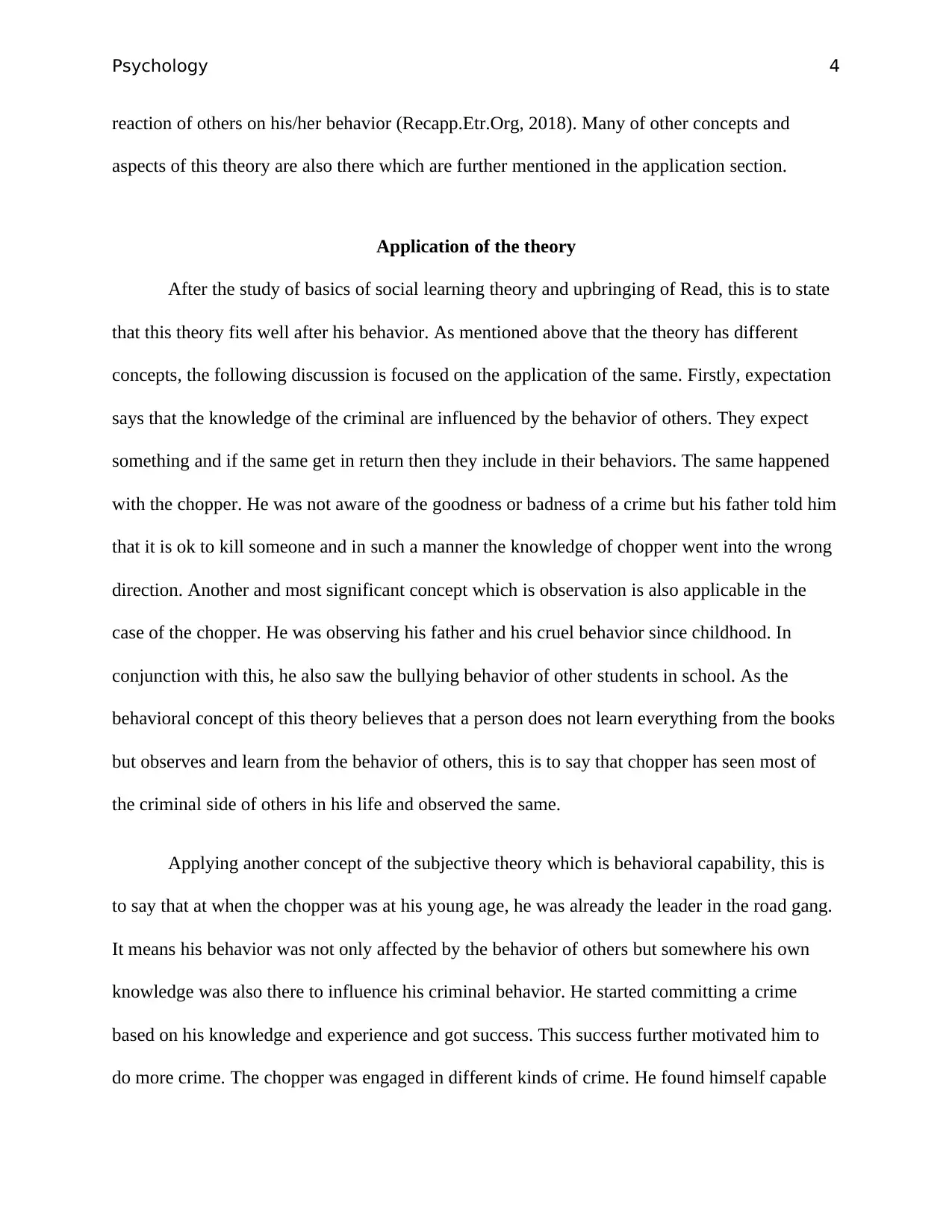
Psychology 4
reaction of others on his/her behavior (Recapp.Etr.Org, 2018). Many of other concepts and
aspects of this theory are also there which are further mentioned in the application section.
Application of the theory
After the study of basics of social learning theory and upbringing of Read, this is to state
that this theory fits well after his behavior. As mentioned above that the theory has different
concepts, the following discussion is focused on the application of the same. Firstly, expectation
says that the knowledge of the criminal are influenced by the behavior of others. They expect
something and if the same get in return then they include in their behaviors. The same happened
with the chopper. He was not aware of the goodness or badness of a crime but his father told him
that it is ok to kill someone and in such a manner the knowledge of chopper went into the wrong
direction. Another and most significant concept which is observation is also applicable in the
case of the chopper. He was observing his father and his cruel behavior since childhood. In
conjunction with this, he also saw the bullying behavior of other students in school. As the
behavioral concept of this theory believes that a person does not learn everything from the books
but observes and learn from the behavior of others, this is to say that chopper has seen most of
the criminal side of others in his life and observed the same.
Applying another concept of the subjective theory which is behavioral capability, this is
to say that at when the chopper was at his young age, he was already the leader in the road gang.
It means his behavior was not only affected by the behavior of others but somewhere his own
knowledge was also there to influence his criminal behavior. He started committing a crime
based on his knowledge and experience and got success. This success further motivated him to
do more crime. The chopper was engaged in different kinds of crime. He found himself capable
reaction of others on his/her behavior (Recapp.Etr.Org, 2018). Many of other concepts and
aspects of this theory are also there which are further mentioned in the application section.
Application of the theory
After the study of basics of social learning theory and upbringing of Read, this is to state
that this theory fits well after his behavior. As mentioned above that the theory has different
concepts, the following discussion is focused on the application of the same. Firstly, expectation
says that the knowledge of the criminal are influenced by the behavior of others. They expect
something and if the same get in return then they include in their behaviors. The same happened
with the chopper. He was not aware of the goodness or badness of a crime but his father told him
that it is ok to kill someone and in such a manner the knowledge of chopper went into the wrong
direction. Another and most significant concept which is observation is also applicable in the
case of the chopper. He was observing his father and his cruel behavior since childhood. In
conjunction with this, he also saw the bullying behavior of other students in school. As the
behavioral concept of this theory believes that a person does not learn everything from the books
but observes and learn from the behavior of others, this is to say that chopper has seen most of
the criminal side of others in his life and observed the same.
Applying another concept of the subjective theory which is behavioral capability, this is
to say that at when the chopper was at his young age, he was already the leader in the road gang.
It means his behavior was not only affected by the behavior of others but somewhere his own
knowledge was also there to influence his criminal behavior. He started committing a crime
based on his knowledge and experience and got success. This success further motivated him to
do more crime. The chopper was engaged in different kinds of crime. He found himself capable
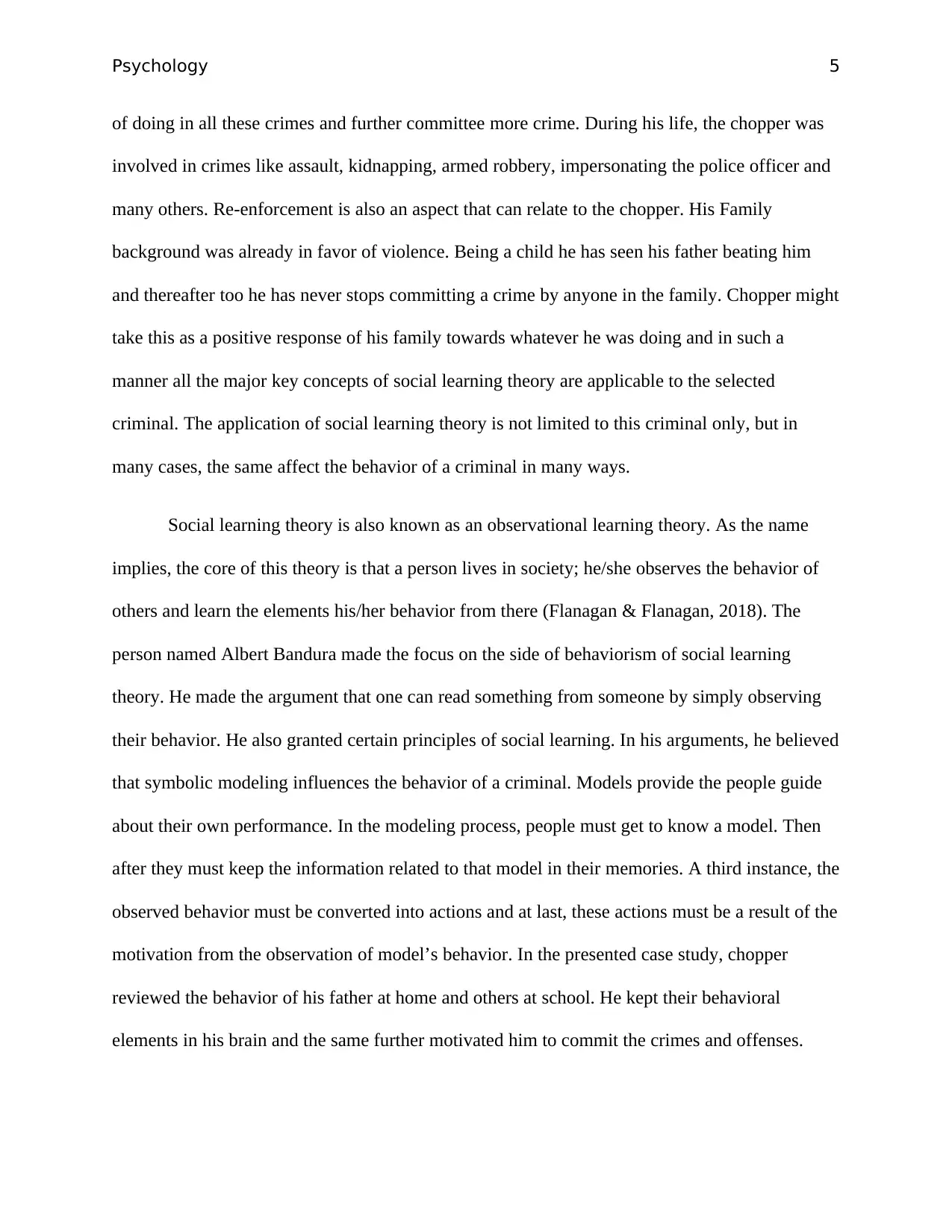
Psychology 5
of doing in all these crimes and further committee more crime. During his life, the chopper was
involved in crimes like assault, kidnapping, armed robbery, impersonating the police officer and
many others. Re-enforcement is also an aspect that can relate to the chopper. His Family
background was already in favor of violence. Being a child he has seen his father beating him
and thereafter too he has never stops committing a crime by anyone in the family. Chopper might
take this as a positive response of his family towards whatever he was doing and in such a
manner all the major key concepts of social learning theory are applicable to the selected
criminal. The application of social learning theory is not limited to this criminal only, but in
many cases, the same affect the behavior of a criminal in many ways.
Social learning theory is also known as an observational learning theory. As the name
implies, the core of this theory is that a person lives in society; he/she observes the behavior of
others and learn the elements his/her behavior from there (Flanagan & Flanagan, 2018). The
person named Albert Bandura made the focus on the side of behaviorism of social learning
theory. He made the argument that one can read something from someone by simply observing
their behavior. He also granted certain principles of social learning. In his arguments, he believed
that symbolic modeling influences the behavior of a criminal. Models provide the people guide
about their own performance. In the modeling process, people must get to know a model. Then
after they must keep the information related to that model in their memories. A third instance, the
observed behavior must be converted into actions and at last, these actions must be a result of the
motivation from the observation of model’s behavior. In the presented case study, chopper
reviewed the behavior of his father at home and others at school. He kept their behavioral
elements in his brain and the same further motivated him to commit the crimes and offenses.
of doing in all these crimes and further committee more crime. During his life, the chopper was
involved in crimes like assault, kidnapping, armed robbery, impersonating the police officer and
many others. Re-enforcement is also an aspect that can relate to the chopper. His Family
background was already in favor of violence. Being a child he has seen his father beating him
and thereafter too he has never stops committing a crime by anyone in the family. Chopper might
take this as a positive response of his family towards whatever he was doing and in such a
manner all the major key concepts of social learning theory are applicable to the selected
criminal. The application of social learning theory is not limited to this criminal only, but in
many cases, the same affect the behavior of a criminal in many ways.
Social learning theory is also known as an observational learning theory. As the name
implies, the core of this theory is that a person lives in society; he/she observes the behavior of
others and learn the elements his/her behavior from there (Flanagan & Flanagan, 2018). The
person named Albert Bandura made the focus on the side of behaviorism of social learning
theory. He made the argument that one can read something from someone by simply observing
their behavior. He also granted certain principles of social learning. In his arguments, he believed
that symbolic modeling influences the behavior of a criminal. Models provide the people guide
about their own performance. In the modeling process, people must get to know a model. Then
after they must keep the information related to that model in their memories. A third instance, the
observed behavior must be converted into actions and at last, these actions must be a result of the
motivation from the observation of model’s behavior. In the presented case study, chopper
reviewed the behavior of his father at home and others at school. He kept their behavioral
elements in his brain and the same further motivated him to commit the crimes and offenses.
⊘ This is a preview!⊘
Do you want full access?
Subscribe today to unlock all pages.

Trusted by 1+ million students worldwide
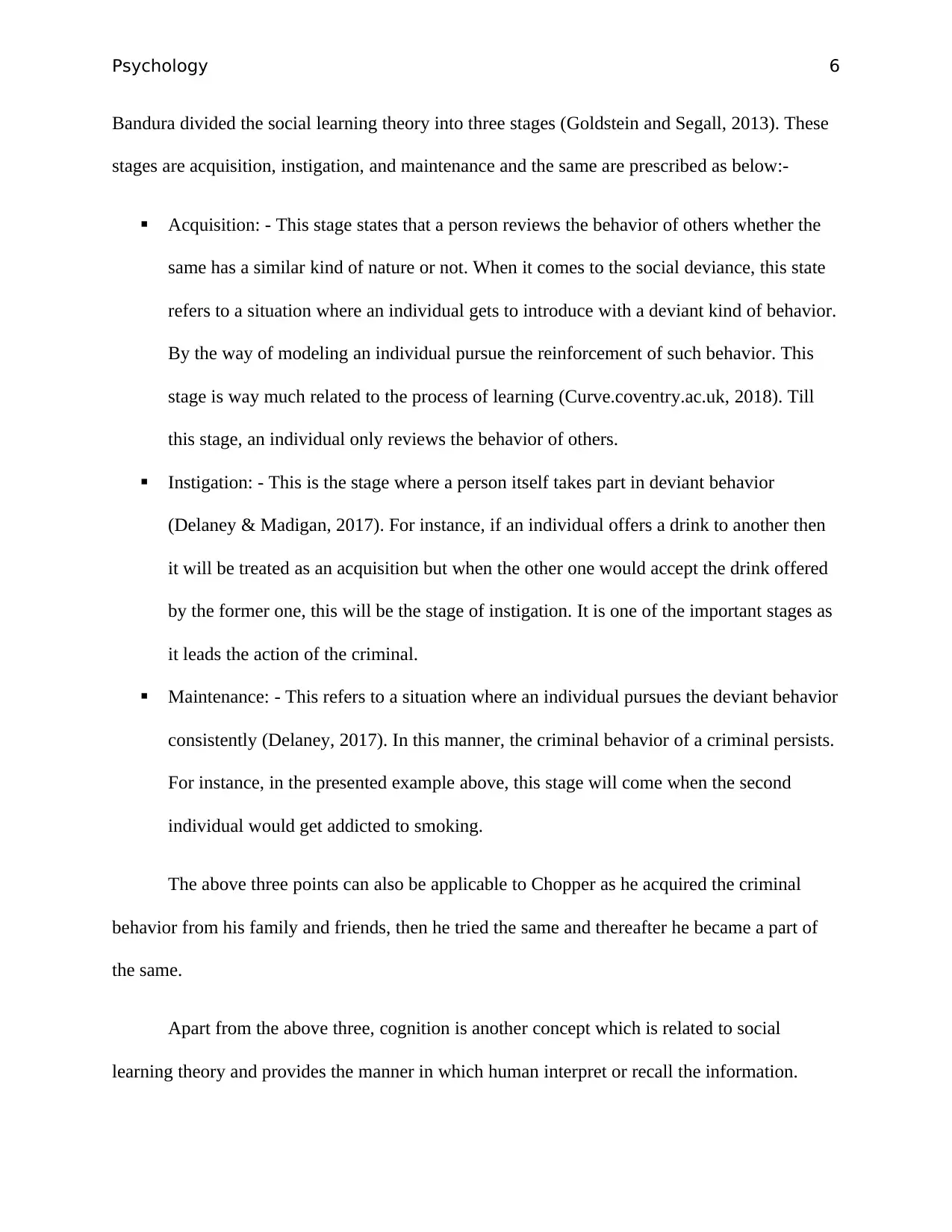
Psychology 6
Bandura divided the social learning theory into three stages (Goldstein and Segall, 2013). These
stages are acquisition, instigation, and maintenance and the same are prescribed as below:-
Acquisition: - This stage states that a person reviews the behavior of others whether the
same has a similar kind of nature or not. When it comes to the social deviance, this state
refers to a situation where an individual gets to introduce with a deviant kind of behavior.
By the way of modeling an individual pursue the reinforcement of such behavior. This
stage is way much related to the process of learning (Curve.coventry.ac.uk, 2018). Till
this stage, an individual only reviews the behavior of others.
Instigation: - This is the stage where a person itself takes part in deviant behavior
(Delaney & Madigan, 2017). For instance, if an individual offers a drink to another then
it will be treated as an acquisition but when the other one would accept the drink offered
by the former one, this will be the stage of instigation. It is one of the important stages as
it leads the action of the criminal.
Maintenance: - This refers to a situation where an individual pursues the deviant behavior
consistently (Delaney, 2017). In this manner, the criminal behavior of a criminal persists.
For instance, in the presented example above, this stage will come when the second
individual would get addicted to smoking.
The above three points can also be applicable to Chopper as he acquired the criminal
behavior from his family and friends, then he tried the same and thereafter he became a part of
the same.
Apart from the above three, cognition is another concept which is related to social
learning theory and provides the manner in which human interpret or recall the information.
Bandura divided the social learning theory into three stages (Goldstein and Segall, 2013). These
stages are acquisition, instigation, and maintenance and the same are prescribed as below:-
Acquisition: - This stage states that a person reviews the behavior of others whether the
same has a similar kind of nature or not. When it comes to the social deviance, this state
refers to a situation where an individual gets to introduce with a deviant kind of behavior.
By the way of modeling an individual pursue the reinforcement of such behavior. This
stage is way much related to the process of learning (Curve.coventry.ac.uk, 2018). Till
this stage, an individual only reviews the behavior of others.
Instigation: - This is the stage where a person itself takes part in deviant behavior
(Delaney & Madigan, 2017). For instance, if an individual offers a drink to another then
it will be treated as an acquisition but when the other one would accept the drink offered
by the former one, this will be the stage of instigation. It is one of the important stages as
it leads the action of the criminal.
Maintenance: - This refers to a situation where an individual pursues the deviant behavior
consistently (Delaney, 2017). In this manner, the criminal behavior of a criminal persists.
For instance, in the presented example above, this stage will come when the second
individual would get addicted to smoking.
The above three points can also be applicable to Chopper as he acquired the criminal
behavior from his family and friends, then he tried the same and thereafter he became a part of
the same.
Apart from the above three, cognition is another concept which is related to social
learning theory and provides the manner in which human interpret or recall the information.
Paraphrase This Document
Need a fresh take? Get an instant paraphrase of this document with our AI Paraphraser
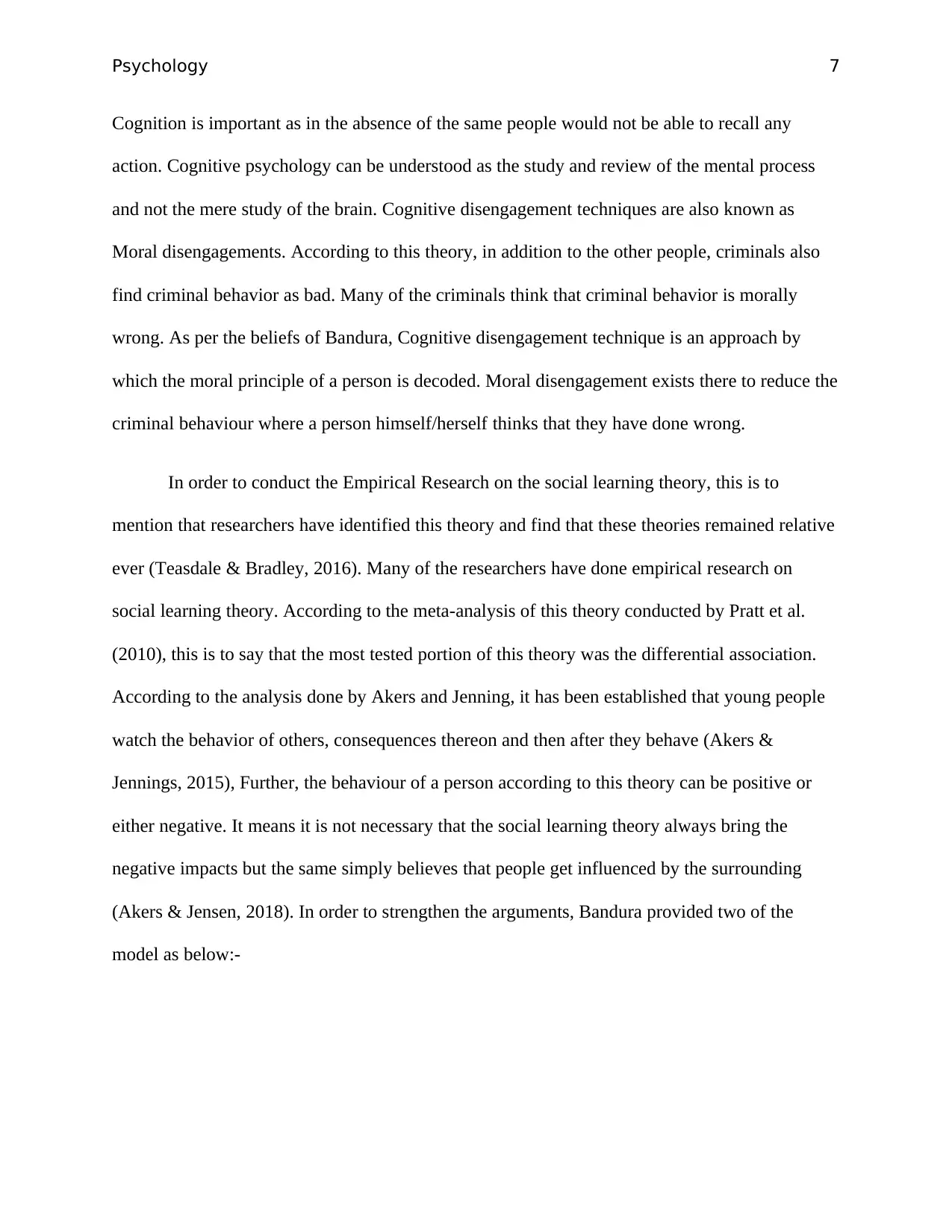
Psychology 7
Cognition is important as in the absence of the same people would not be able to recall any
action. Cognitive psychology can be understood as the study and review of the mental process
and not the mere study of the brain. Cognitive disengagement techniques are also known as
Moral disengagements. According to this theory, in addition to the other people, criminals also
find criminal behavior as bad. Many of the criminals think that criminal behavior is morally
wrong. As per the beliefs of Bandura, Cognitive disengagement technique is an approach by
which the moral principle of a person is decoded. Moral disengagement exists there to reduce the
criminal behaviour where a person himself/herself thinks that they have done wrong.
In order to conduct the Empirical Research on the social learning theory, this is to
mention that researchers have identified this theory and find that these theories remained relative
ever (Teasdale & Bradley, 2016). Many of the researchers have done empirical research on
social learning theory. According to the meta-analysis of this theory conducted by Pratt et al.
(2010), this is to say that the most tested portion of this theory was the differential association.
According to the analysis done by Akers and Jenning, it has been established that young people
watch the behavior of others, consequences thereon and then after they behave (Akers &
Jennings, 2015), Further, the behaviour of a person according to this theory can be positive or
either negative. It means it is not necessary that the social learning theory always bring the
negative impacts but the same simply believes that people get influenced by the surrounding
(Akers & Jensen, 2018). In order to strengthen the arguments, Bandura provided two of the
model as below:-
Cognition is important as in the absence of the same people would not be able to recall any
action. Cognitive psychology can be understood as the study and review of the mental process
and not the mere study of the brain. Cognitive disengagement techniques are also known as
Moral disengagements. According to this theory, in addition to the other people, criminals also
find criminal behavior as bad. Many of the criminals think that criminal behavior is morally
wrong. As per the beliefs of Bandura, Cognitive disengagement technique is an approach by
which the moral principle of a person is decoded. Moral disengagement exists there to reduce the
criminal behaviour where a person himself/herself thinks that they have done wrong.
In order to conduct the Empirical Research on the social learning theory, this is to
mention that researchers have identified this theory and find that these theories remained relative
ever (Teasdale & Bradley, 2016). Many of the researchers have done empirical research on
social learning theory. According to the meta-analysis of this theory conducted by Pratt et al.
(2010), this is to say that the most tested portion of this theory was the differential association.
According to the analysis done by Akers and Jenning, it has been established that young people
watch the behavior of others, consequences thereon and then after they behave (Akers &
Jennings, 2015), Further, the behaviour of a person according to this theory can be positive or
either negative. It means it is not necessary that the social learning theory always bring the
negative impacts but the same simply believes that people get influenced by the surrounding
(Akers & Jensen, 2018). In order to strengthen the arguments, Bandura provided two of the
model as below:-
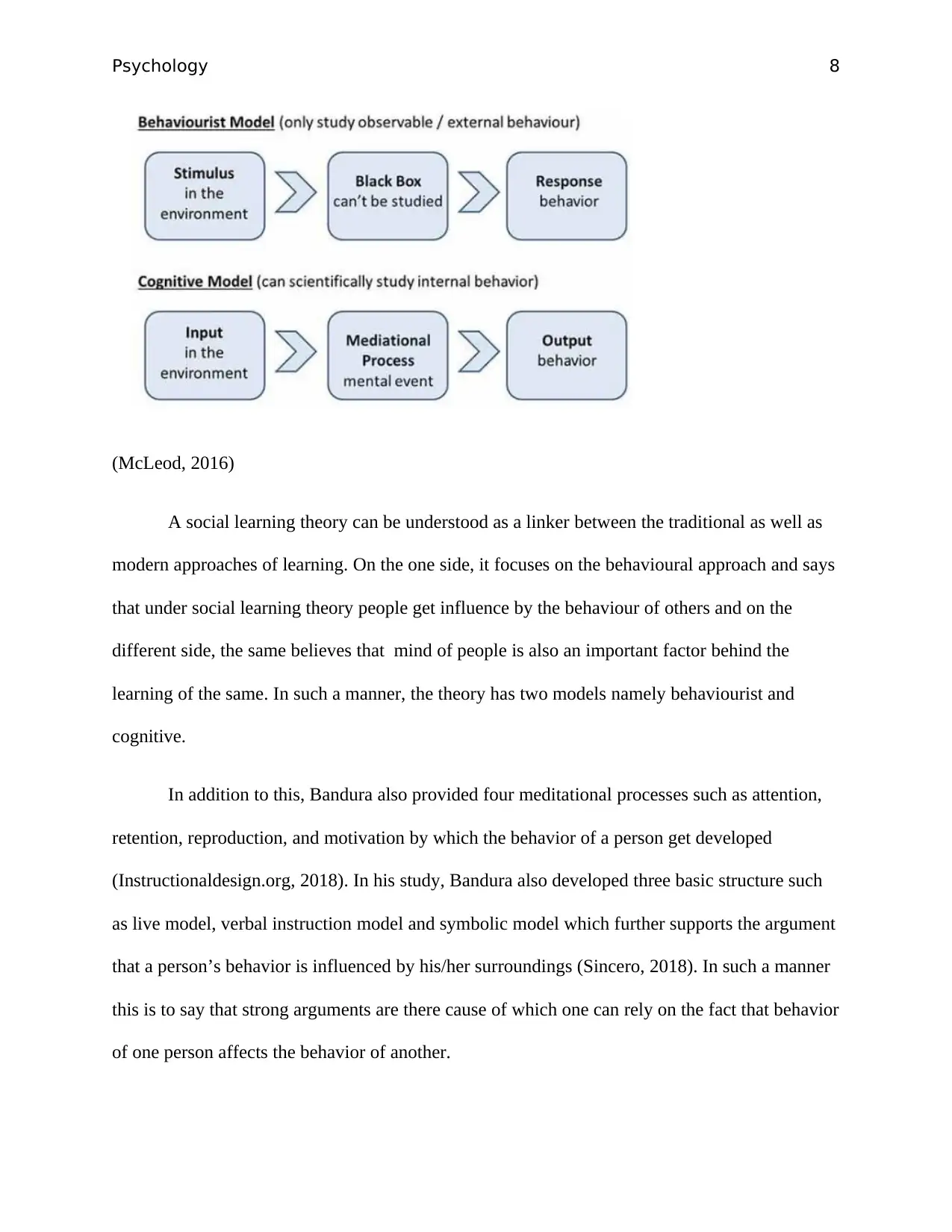
Psychology 8
(McLeod, 2016)
A social learning theory can be understood as a linker between the traditional as well as
modern approaches of learning. On the one side, it focuses on the behavioural approach and says
that under social learning theory people get influence by the behaviour of others and on the
different side, the same believes that mind of people is also an important factor behind the
learning of the same. In such a manner, the theory has two models namely behaviourist and
cognitive.
In addition to this, Bandura also provided four meditational processes such as attention,
retention, reproduction, and motivation by which the behavior of a person get developed
(Instructionaldesign.org, 2018). In his study, Bandura also developed three basic structure such
as live model, verbal instruction model and symbolic model which further supports the argument
that a person’s behavior is influenced by his/her surroundings (Sincero, 2018). In such a manner
this is to say that strong arguments are there cause of which one can rely on the fact that behavior
of one person affects the behavior of another.
(McLeod, 2016)
A social learning theory can be understood as a linker between the traditional as well as
modern approaches of learning. On the one side, it focuses on the behavioural approach and says
that under social learning theory people get influence by the behaviour of others and on the
different side, the same believes that mind of people is also an important factor behind the
learning of the same. In such a manner, the theory has two models namely behaviourist and
cognitive.
In addition to this, Bandura also provided four meditational processes such as attention,
retention, reproduction, and motivation by which the behavior of a person get developed
(Instructionaldesign.org, 2018). In his study, Bandura also developed three basic structure such
as live model, verbal instruction model and symbolic model which further supports the argument
that a person’s behavior is influenced by his/her surroundings (Sincero, 2018). In such a manner
this is to say that strong arguments are there cause of which one can rely on the fact that behavior
of one person affects the behavior of another.
⊘ This is a preview!⊘
Do you want full access?
Subscribe today to unlock all pages.

Trusted by 1+ million students worldwide
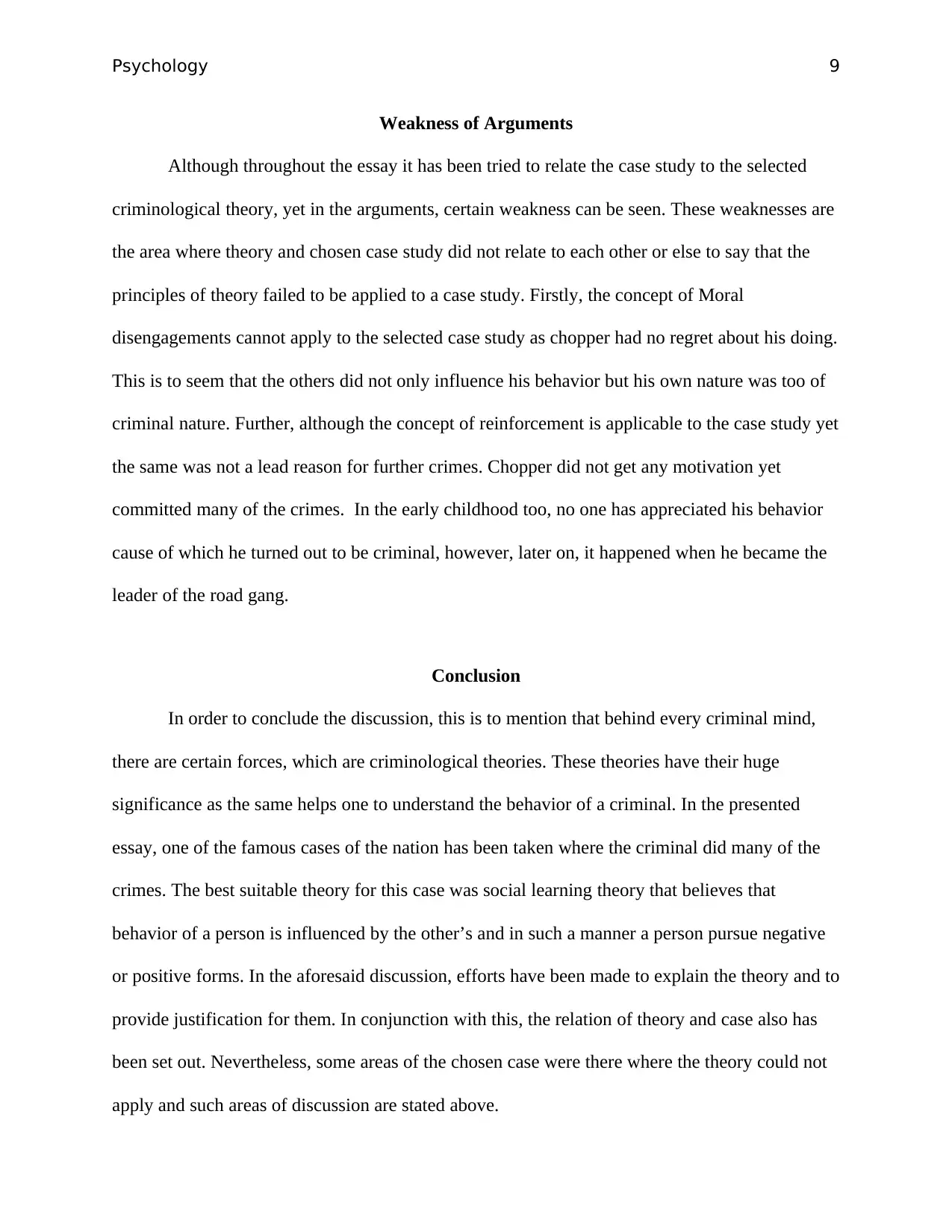
Psychology 9
Weakness of Arguments
Although throughout the essay it has been tried to relate the case study to the selected
criminological theory, yet in the arguments, certain weakness can be seen. These weaknesses are
the area where theory and chosen case study did not relate to each other or else to say that the
principles of theory failed to be applied to a case study. Firstly, the concept of Moral
disengagements cannot apply to the selected case study as chopper had no regret about his doing.
This is to seem that the others did not only influence his behavior but his own nature was too of
criminal nature. Further, although the concept of reinforcement is applicable to the case study yet
the same was not a lead reason for further crimes. Chopper did not get any motivation yet
committed many of the crimes. In the early childhood too, no one has appreciated his behavior
cause of which he turned out to be criminal, however, later on, it happened when he became the
leader of the road gang.
Conclusion
In order to conclude the discussion, this is to mention that behind every criminal mind,
there are certain forces, which are criminological theories. These theories have their huge
significance as the same helps one to understand the behavior of a criminal. In the presented
essay, one of the famous cases of the nation has been taken where the criminal did many of the
crimes. The best suitable theory for this case was social learning theory that believes that
behavior of a person is influenced by the other’s and in such a manner a person pursue negative
or positive forms. In the aforesaid discussion, efforts have been made to explain the theory and to
provide justification for them. In conjunction with this, the relation of theory and case also has
been set out. Nevertheless, some areas of the chosen case were there where the theory could not
apply and such areas of discussion are stated above.
Weakness of Arguments
Although throughout the essay it has been tried to relate the case study to the selected
criminological theory, yet in the arguments, certain weakness can be seen. These weaknesses are
the area where theory and chosen case study did not relate to each other or else to say that the
principles of theory failed to be applied to a case study. Firstly, the concept of Moral
disengagements cannot apply to the selected case study as chopper had no regret about his doing.
This is to seem that the others did not only influence his behavior but his own nature was too of
criminal nature. Further, although the concept of reinforcement is applicable to the case study yet
the same was not a lead reason for further crimes. Chopper did not get any motivation yet
committed many of the crimes. In the early childhood too, no one has appreciated his behavior
cause of which he turned out to be criminal, however, later on, it happened when he became the
leader of the road gang.
Conclusion
In order to conclude the discussion, this is to mention that behind every criminal mind,
there are certain forces, which are criminological theories. These theories have their huge
significance as the same helps one to understand the behavior of a criminal. In the presented
essay, one of the famous cases of the nation has been taken where the criminal did many of the
crimes. The best suitable theory for this case was social learning theory that believes that
behavior of a person is influenced by the other’s and in such a manner a person pursue negative
or positive forms. In the aforesaid discussion, efforts have been made to explain the theory and to
provide justification for them. In conjunction with this, the relation of theory and case also has
been set out. Nevertheless, some areas of the chosen case were there where the theory could not
apply and such areas of discussion are stated above.
Paraphrase This Document
Need a fresh take? Get an instant paraphrase of this document with our AI Paraphraser
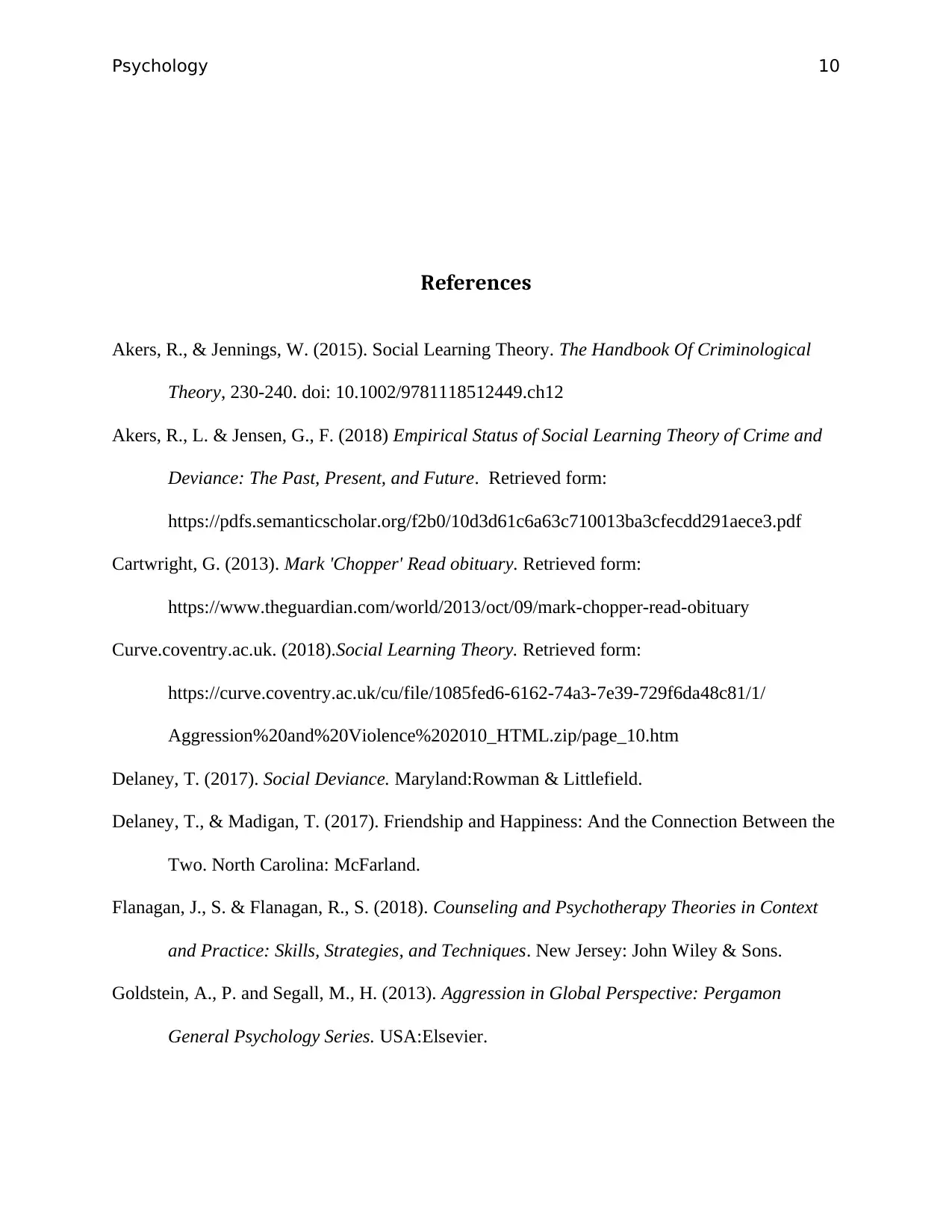
Psychology 10
References
Akers, R., & Jennings, W. (2015). Social Learning Theory. The Handbook Of Criminological
Theory, 230-240. doi: 10.1002/9781118512449.ch12
Akers, R., L. & Jensen, G., F. (2018) Empirical Status of Social Learning Theory of Crime and
Deviance: The Past, Present, and Future. Retrieved form:
https://pdfs.semanticscholar.org/f2b0/10d3d61c6a63c710013ba3cfecdd291aece3.pdf
Cartwright, G. (2013). Mark 'Chopper' Read obituary. Retrieved form:
https://www.theguardian.com/world/2013/oct/09/mark-chopper-read-obituary
Curve.coventry.ac.uk. (2018).Social Learning Theory. Retrieved form:
https://curve.coventry.ac.uk/cu/file/1085fed6-6162-74a3-7e39-729f6da48c81/1/
Aggression%20and%20Violence%202010_HTML.zip/page_10.htm
Delaney, T. (2017). Social Deviance. Maryland:Rowman & Littlefield.
Delaney, T., & Madigan, T. (2017). Friendship and Happiness: And the Connection Between the
Two. North Carolina: McFarland.
Flanagan, J., S. & Flanagan, R., S. (2018). Counseling and Psychotherapy Theories in Context
and Practice: Skills, Strategies, and Techniques. New Jersey: John Wiley & Sons.
Goldstein, A., P. and Segall, M., H. (2013). Aggression in Global Perspective: Pergamon
General Psychology Series. USA:Elsevier.
References
Akers, R., & Jennings, W. (2015). Social Learning Theory. The Handbook Of Criminological
Theory, 230-240. doi: 10.1002/9781118512449.ch12
Akers, R., L. & Jensen, G., F. (2018) Empirical Status of Social Learning Theory of Crime and
Deviance: The Past, Present, and Future. Retrieved form:
https://pdfs.semanticscholar.org/f2b0/10d3d61c6a63c710013ba3cfecdd291aece3.pdf
Cartwright, G. (2013). Mark 'Chopper' Read obituary. Retrieved form:
https://www.theguardian.com/world/2013/oct/09/mark-chopper-read-obituary
Curve.coventry.ac.uk. (2018).Social Learning Theory. Retrieved form:
https://curve.coventry.ac.uk/cu/file/1085fed6-6162-74a3-7e39-729f6da48c81/1/
Aggression%20and%20Violence%202010_HTML.zip/page_10.htm
Delaney, T. (2017). Social Deviance. Maryland:Rowman & Littlefield.
Delaney, T., & Madigan, T. (2017). Friendship and Happiness: And the Connection Between the
Two. North Carolina: McFarland.
Flanagan, J., S. & Flanagan, R., S. (2018). Counseling and Psychotherapy Theories in Context
and Practice: Skills, Strategies, and Techniques. New Jersey: John Wiley & Sons.
Goldstein, A., P. and Segall, M., H. (2013). Aggression in Global Perspective: Pergamon
General Psychology Series. USA:Elsevier.
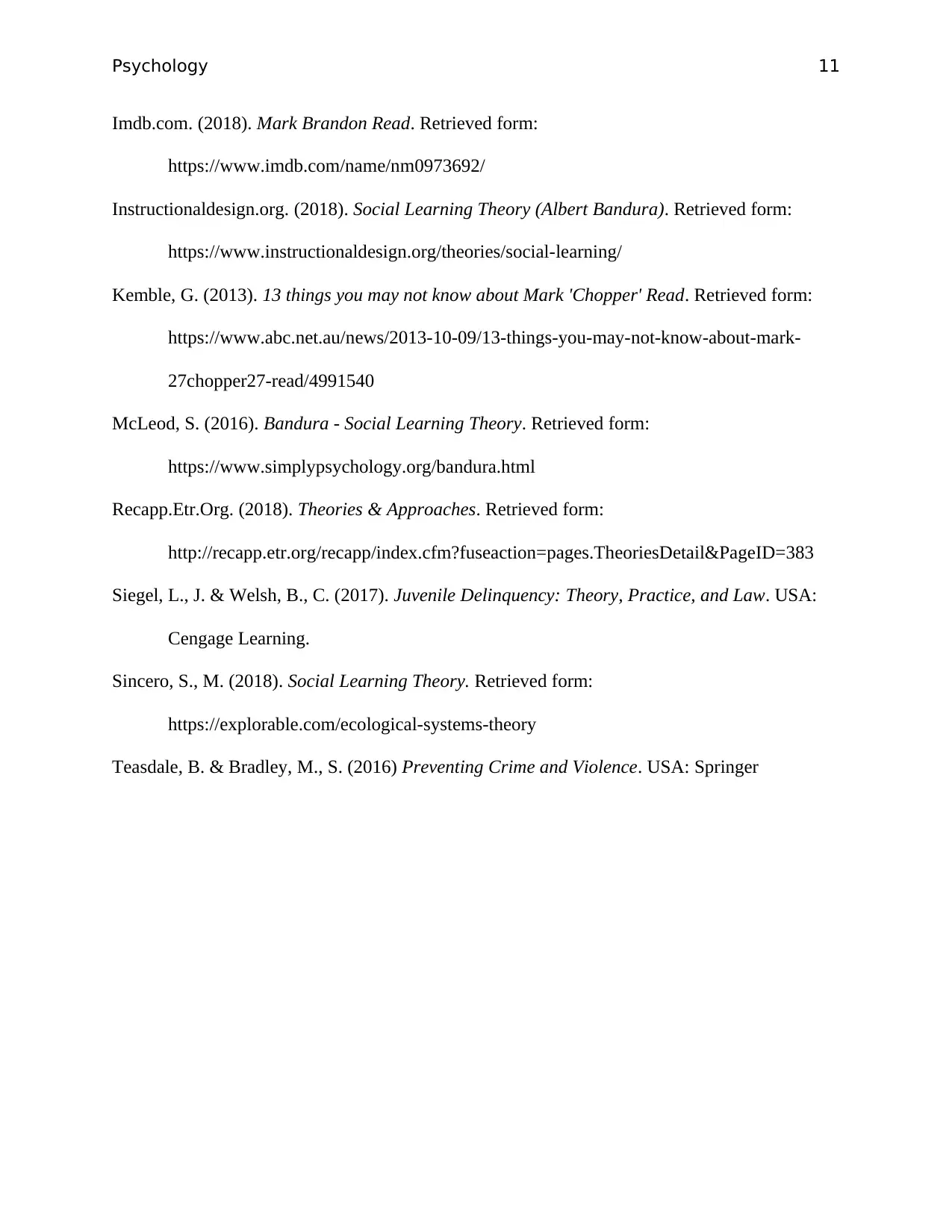
Psychology 11
Imdb.com. (2018). Mark Brandon Read. Retrieved form:
https://www.imdb.com/name/nm0973692/
Instructionaldesign.org. (2018). Social Learning Theory (Albert Bandura). Retrieved form:
https://www.instructionaldesign.org/theories/social-learning/
Kemble, G. (2013). 13 things you may not know about Mark 'Chopper' Read. Retrieved form:
https://www.abc.net.au/news/2013-10-09/13-things-you-may-not-know-about-mark-
27chopper27-read/4991540
McLeod, S. (2016). Bandura - Social Learning Theory. Retrieved form:
https://www.simplypsychology.org/bandura.html
Recapp.Etr.Org. (2018). Theories & Approaches. Retrieved form:
http://recapp.etr.org/recapp/index.cfm?fuseaction=pages.TheoriesDetail&PageID=383
Siegel, L., J. & Welsh, B., C. (2017). Juvenile Delinquency: Theory, Practice, and Law. USA:
Cengage Learning.
Sincero, S., M. (2018). Social Learning Theory. Retrieved form:
https://explorable.com/ecological-systems-theory
Teasdale, B. & Bradley, M., S. (2016) Preventing Crime and Violence. USA: Springer
Imdb.com. (2018). Mark Brandon Read. Retrieved form:
https://www.imdb.com/name/nm0973692/
Instructionaldesign.org. (2018). Social Learning Theory (Albert Bandura). Retrieved form:
https://www.instructionaldesign.org/theories/social-learning/
Kemble, G. (2013). 13 things you may not know about Mark 'Chopper' Read. Retrieved form:
https://www.abc.net.au/news/2013-10-09/13-things-you-may-not-know-about-mark-
27chopper27-read/4991540
McLeod, S. (2016). Bandura - Social Learning Theory. Retrieved form:
https://www.simplypsychology.org/bandura.html
Recapp.Etr.Org. (2018). Theories & Approaches. Retrieved form:
http://recapp.etr.org/recapp/index.cfm?fuseaction=pages.TheoriesDetail&PageID=383
Siegel, L., J. & Welsh, B., C. (2017). Juvenile Delinquency: Theory, Practice, and Law. USA:
Cengage Learning.
Sincero, S., M. (2018). Social Learning Theory. Retrieved form:
https://explorable.com/ecological-systems-theory
Teasdale, B. & Bradley, M., S. (2016) Preventing Crime and Violence. USA: Springer
⊘ This is a preview!⊘
Do you want full access?
Subscribe today to unlock all pages.

Trusted by 1+ million students worldwide
1 out of 12
Related Documents
Your All-in-One AI-Powered Toolkit for Academic Success.
+13062052269
info@desklib.com
Available 24*7 on WhatsApp / Email
![[object Object]](/_next/static/media/star-bottom.7253800d.svg)
Unlock your academic potential
Copyright © 2020–2026 A2Z Services. All Rights Reserved. Developed and managed by ZUCOL.





